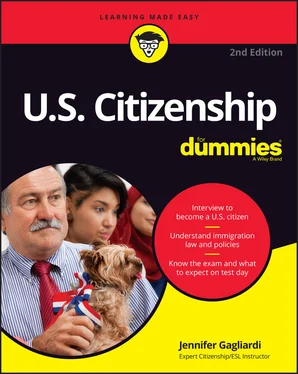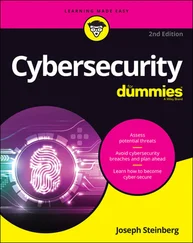Jennifer Gagliardi - U.S. Citizenship For Dummies
Здесь есть возможность читать онлайн «Jennifer Gagliardi - U.S. Citizenship For Dummies» — ознакомительный отрывок электронной книги совершенно бесплатно, а после прочтения отрывка купить полную версию. В некоторых случаях можно слушать аудио, скачать через торрент в формате fb2 и присутствует краткое содержание. Жанр: unrecognised, на английском языке. Описание произведения, (предисловие) а так же отзывы посетителей доступны на портале библиотеки ЛибКат.
- Название:U.S. Citizenship For Dummies
- Автор:
- Жанр:
- Год:неизвестен
- ISBN:нет данных
- Рейтинг книги:3 / 5. Голосов: 1
-
Избранное:Добавить в избранное
- Отзывы:
-
Ваша оценка:
- 60
- 1
- 2
- 3
- 4
- 5
U.S. Citizenship For Dummies: краткое содержание, описание и аннотация
Предлагаем к чтению аннотацию, описание, краткое содержание или предисловие (зависит от того, что написал сам автор книги «U.S. Citizenship For Dummies»). Если вы не нашли необходимую информацию о книге — напишите в комментариях, мы постараемся отыскать её.
U.S. Citizenship For Dummies
U.S. Citizenship For Dummies
U.S. Citizenship For Dummies — читать онлайн ознакомительный отрывок
Ниже представлен текст книги, разбитый по страницам. Система сохранения места последней прочитанной страницы, позволяет с удобством читать онлайн бесплатно книгу «U.S. Citizenship For Dummies», без необходимости каждый раз заново искать на чём Вы остановились. Поставьте закладку, и сможете в любой момент перейти на страницу, на которой закончили чтение.
Интервал:
Закладка:
U.S Citizenship and Immigration Services (USCIS) won’t count time you spent here illegally before April 1, 1997. Asylees (with pending cases), minors under the age of 18, Family Unity beneficiaries, and battered spouses/children and victims of trafficking (who can prove a connection between the status violation and abuse) do not accrue unlawful presence.
For further information, USCIS.gov has a detailed web page about Unlawful Presence and Bars to Admissibility with a link to the USCIS Adjudicators Field Guide (ch.40.9.2), which describes special circumstances and remedies. Please consult with an immigration legal service representative about lawful presence issues.
 Bottom line: Don’t overstay your welcome. If you’re in the United States on a temporary visa and you stay after your visa expires, you’re putting your future chances for lawful permanent residence at risk. Being in the country illegally is grounds for removal and for denial of future immigration benefits. If you are currently in the country illegally, you should seek competent legal advice before leaving the United States to try to secure a visa.
Bottom line: Don’t overstay your welcome. If you’re in the United States on a temporary visa and you stay after your visa expires, you’re putting your future chances for lawful permanent residence at risk. Being in the country illegally is grounds for removal and for denial of future immigration benefits. If you are currently in the country illegally, you should seek competent legal advice before leaving the United States to try to secure a visa.
 To check whether your immigration status is currently legal, rely on your I-94 (Arrival-Departure Record). You receive this document from U.S. Customs and Border Protection (find out more about the CBP in Chapter 2) upon entering the country, or from the USCIS if you extended your immigration status while already in the United States. Many people believe the visa is what determines the amount of time you can stay in the United States, but this isn’t the case.
To check whether your immigration status is currently legal, rely on your I-94 (Arrival-Departure Record). You receive this document from U.S. Customs and Border Protection (find out more about the CBP in Chapter 2) upon entering the country, or from the USCIS if you extended your immigration status while already in the United States. Many people believe the visa is what determines the amount of time you can stay in the United States, but this isn’t the case.
The CBP is supposed to give a person the amount of time for which a visa petition is approved, rather than the amount of time the visa is valid — which is sometimes less than the amount of time granted in the petition. Likewise, the CBP can approve entry for a lesser amount of time than the visa would indicate.
 If you stay in the United States for more time than your I-94 allows, you are out of status, even if your visa indicates a longer period.
If you stay in the United States for more time than your I-94 allows, you are out of status, even if your visa indicates a longer period.
Your visa can say it expires tomorrow, but the airport inspector can stamp your I-94 for six months. On the other hand, your visa can say it’s valid through 2010, but the inspector can stamp you for only one month. The stamp is always your guide.
 HOW IMMIGRATION LAW DEFINES CHILDREN
HOW IMMIGRATION LAW DEFINES CHILDREN
The definition of a child has specific meaning in immigration law. When you read government documents that say, for instance, that you’re able to sponsor “children,” that means you can sponsor an unmarried son or daughter under the age of 21 who was born in wedlock or is your legally recognized stepchild or adopted child. If, on the other hand, an immigration document refers to a “son or daughter,” this refers to a child age 21 or older.
How can you achieve legal permanent residence? Although there are other ways, which we go into in Chapter 3, most people immigrate for one of two reasons:
To reunite with family members already living in the United States
To pursue a permanent employment opportunity in the United States
Reuniting with your family
In order to use family connections to immigrate to the United States, you must have a close relative already living here who is willing to sponsor you. So how close is close? If your relative is at least 21 years old and a U.S. citizen, born or naturalized, they may sponsor you if you are their
Husband or wife
Unmarried child under age 21
Unmarried son or daughter over age 21
Married son or daughter
Brother or sister
Parent
Citizens may not sponsor their grandparents, grandchildren, aunts, uncles, cousins, or anyone else.
Legal permanent residents, or green-card holders — those legally living and working in the United States who have not become naturalized citizens — may only sponsor their
Husband or wife
Unmarried children of any age
Legal permanent residents (green-card holders) may not sponsor brothers or sisters, parents, grandparents, grandchildren, aunts, uncles, cousins, or anyone other than their spouse and children.
But wait, it’s not so easy. Beyond having a willingness to sponsor you, your relative must meet certain criteria in order to be eligible to become a sponsor:
Your relative must be able to provide documentation of their own immigration status — as a lawful permanent resident or as a United States citizen (born or naturalized).
Your relative must be able to prove that they can financially support you (and any other family members they are financially responsible for) at 125 percent above the government-mandated poverty level. In other words, in order for a sponsor to bring a relative to live permanently in the United States, the sponsor must be both willing and able to accept legal responsibility for financially supporting that family member. You can find more information about how to meet this qualification in Chapter 3.
Pursuing employment opportunities
If you want to immigrate to the United States based on the fact that you have a full-time, permanent employment opportunity waiting for you here, both you and your prospective employer must meet a list of specific qualifications. Although one of the goals of the USCIS is to provide the United States with a strong and stable workforce, the USCIS also wants to be sure that immigrants aren’t taking jobs that would otherwise go to unemployed U.S. citizens.
 Before you even get started, keep in mind that your prospective employer has to first certify the position with the Department of Labor. This Labor Certification is required to show there are no qualified, available U.S. workers to fill the job.
Before you even get started, keep in mind that your prospective employer has to first certify the position with the Department of Labor. This Labor Certification is required to show there are no qualified, available U.S. workers to fill the job.
The USCIS grants permanent residence based on employment skills in one of five categories:
Priority Workers (category EB-1) have extraordinary ability in the arts, education, business, science, or athletics, or are considered to be outstanding professors or researchers. Notice the superlatives: extraordinary, outstanding. This category is one of the most difficult ones to qualify for unless you’re a Nobel Prize winner or hold other such prestigious and public accolades in your given field. You may qualify, however, by presenting extensive documentation proving your professional or academic achievements in one of the listed fields as well as evidence of your financial success in your field and your ability to substantially benefit the United States. Another way to qualify for the Priority Workers category is if you happen to be a manager or executive of a company that has transferred you to one of its branches in the United States.
Professionals with Advanced Degrees or Persons with Exceptional Ability (category EB-2) are members of their professions holding advanced degrees, or their U.S. equivalent, or persons with exceptional ability in business, sciences, or the arts who will benefit the interests or welfare of the United States. In order to qualify for this category, be prepared to show how becoming a legal permanent resident will be good for the economy or culture of the United States or how you can help meet the academic needs of the country. You may also qualify for this category if you’re a qualified physician and you agree to practice medicine in an area of the United States that is medically underserved.
Читать дальшеИнтервал:
Закладка:
Похожие книги на «U.S. Citizenship For Dummies»
Представляем Вашему вниманию похожие книги на «U.S. Citizenship For Dummies» списком для выбора. Мы отобрали схожую по названию и смыслу литературу в надежде предоставить читателям больше вариантов отыскать новые, интересные, ещё непрочитанные произведения.
Обсуждение, отзывы о книге «U.S. Citizenship For Dummies» и просто собственные мнения читателей. Оставьте ваши комментарии, напишите, что Вы думаете о произведении, его смысле или главных героях. Укажите что конкретно понравилось, а что нет, и почему Вы так считаете.












